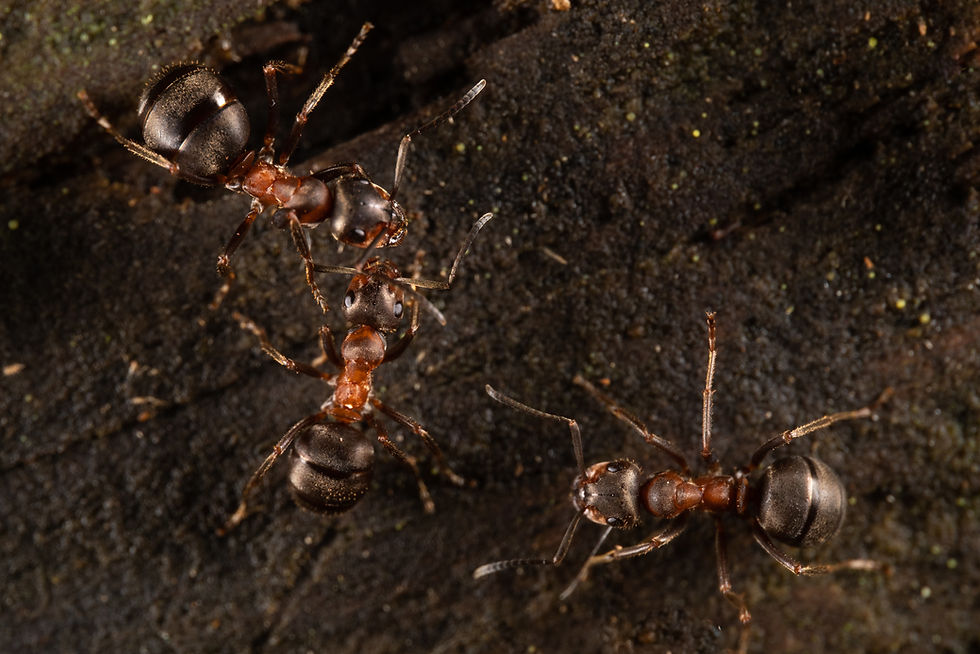Wood Wide Ants (WWA): genomics over space and time of the keystone forest species Formica paralugubris
- luisamarins19
- Jan 13
- 3 min read
The Wood Wide Ants (WWA) project started in the late winter of 2023, as a collaboration among research groups of the Italian Universities of Bologna, Firenze, and Pavia. It involves about 12 researchers and many bachelors and masters students.
The wood ant Formica paralugubris belongs to the threatened F. rufa species complex, native to the Alps. F. paralugubris is extremely important for forest ecosystems across multiple trophic levels. Starting from 1958, nests were transplanted to Apennines to fight important forest pest species. In introduction areas this species tends to be invasive outcompeting other ants and affecting arthropod communities. Alpine populations are characterised by low genetic variability and they have been subjected to local extinctions, thereby, transplanted populations may represent an important source of genetic diversity.


The first objective of the WWA Project is to generate a high-quality, chromosome level, reference genome of Formica paralugubris, to be used for population genomics analyses on Illumina resequencing data. We seek to elucidate the population structure and demographic dynamics of both native (Alps) and introduced (Foreste Casentinesi National Park, Apennines) populations, while also including museum samples (Kosmos Museum, Pavia, Italy), which will allow us to investigate population differentiation over both space and time. Our findings will contribute to the conservation efforts for native populations, and enhance our understanding of the consequences of recent human-mediated introductions in forest ecosystems.

We collaborate with a broad range of stakeholders and our goal is to increase the awareness of the public about the role of biodiversity genomics in conservation actions, especially towards less charismatic invertebrate species.
We aim to promote the creation of more consistent legislation across various regions, thereby facilitating the protection of these species. In this context, F. paralugubris may serve as a valuable model for disseminating the possible pros and cons of human-mediated introductions of alien species. In fact, although F. paralugubris and red wood ants are classified as “Near Threatened” by the IUCN Red List, regulations governing their protection vary significantly across European countries.

This project is funded by the Horizon Europe program, by the European Union - NextGenerationEU, under the National Recovery and Resilience Plan (NRRP), Project title “National Biodiversity Future Center -NBFC” (project code CN_00000033), with additional support from the Canziani Bequest and “Ricerca Fondamentale Orientata” funds from the University of Bologna. We also thank BGE-ERGA for providing a collaborative platform that made this research possible.
About the Authors
Fabrizio Ghiselli is Associate Professor of Zoology at the University of Bologna, working on molecular evolution and comparative genomics. He is an ERGA member since 2021, and Co-Chair of the ERGA Social Justice Committee. He also participates in the ERGA Ethical, Legal, and Social Issues (ELSI) committee, and is interested in training, knowledge transfer, and citizen science.
Enrico Strada (University of Bologna) is responsible for scientific and educational dissemination. He has curated Citizen Science and scientific communication activities, focusing on myrmecology and urban biodiversity. Two of his main missions are making the community discover the fascinating world of entomology, and emphasizing the fundamental role that each informed individual can have for the conservation of biodiversity and environments. This approach perfectly aligns with the goals of the WWA project!
Filippo Nicolini is a postdoc at the University of Leicester (UK) and former PhD student at the University of Bologna (IT), working mainly on comparative and evolutionary genomics in invertebrate species. He is also an evo-devo and science communication enthusiast.
WWA links: https://linktr.ee/antswoodwide



